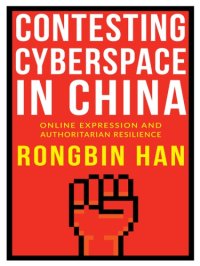
Ebook: Contesting cyberspace in China: online expression and authoritarian resilience
Author: Han Rongbin
- Tags: Authoritarianism, Authoritarianism--China, Censorship, Censorship--China, Cyberspace, Freedom of speech, Freedom of speech--China, Internet--Government policy, Internet--Government policy--China, Internet--Political aspects, Internet--Political aspects--China, Meinungsäußerung, POLITICAL SCIENCE--World--Asian, PSYCHOLOGY--Social Psychology, Zensur, Electronic books, Internet -- Government policy -- China, Internet -- Political aspects -- China, Freedom of speech -- China, Censorship -- China, Authoritarianism -- Ch
- Year: 2018
- Publisher: Columbia University Press
- City: China
- Language: English
- epub
The Internet was supposed to be an antidote to authoritarianism. It can enable citizens to express themselves freely and organize outside state control. Yet while online activity has helped challenge authoritarian rule in some cases, other regimes have endured: no movement comparable to the Arab Spring has arisen in China. In Contesting Cyberspace in China, Rongbin Han offers a powerful counterintuitive explanation for the survival of the world's largest authoritarian regime in the digital age. Han reveals the complex internal dynamics of online expression in China, showing how the state, service providers, and netizens negotiate the limits of discourse. He finds that state censorship has conditioned online expression, yet has failed to bring it under control. However, Han also finds that freer expression may work to the advantage of the regime because its critics are not the only ones empowered: the Internet has proved less threatening than expected due to the multiplicity of beliefs, identities, and values online. State-sponsored and spontaneous pro-government commenters have turned out to be a major presence on the Chinese internet, denigrating dissenters and barraging oppositional voices. Han explores the recruitment, training, and behavior of hired commenters, the "fifty-cent army," as well as group identity formation among nationalistic Internet posters who see themselves as patriots defending China against online saboteurs. Drawing on a rich set of data collected through interviews, participant observation, and long-term online ethnography, as well as official reports and state directives, Contesting Cyberspace in China interrogates our assumptions about authoritarian resilience and the democratizing power of the Internet.;Introduction -- Harmonizing the Internet -- To comply or to resist -- Pop activism -- Trolling for the party -- Manufacturing distrust -- Defending the regime -- Authoritarian resilience online.
Download the book Contesting cyberspace in China: online expression and authoritarian resilience for free or read online
Continue reading on any device:

Last viewed books
Related books
{related-news}
Comments (0)